If your sales rep just closed a million-dollar deal, you’d want to know exactly how they did it, so you could do it again. But imagine that — instead of pinpointing the right lead, addressing the perfect pain point, and following up at the ideal time — they just shrugged and said it was “luck.”
Too many B2B sales teams still rely on gut instinct and outdated spreadsheets to navigate complex buyer journeys. Meanwhile, competitors are already using AI to predict which leads will convert, personalize outreach at scale, and uncover hidden revenue opportunities.
AI in B2B sales is quickly becoming the standard for teams that want to sell smarter, faster, and with more precision. Let’s dive into how the smartest B2B companies are using AI and systems like monday CRM to boost sales productivity.
Try monday CRMWhat is AI for B2B sales?
AI for B2B sales means using artificial intelligence to help teams sell faster, smarter, and with less guesswork. Instead of spending hours updating spreadsheets or manually sorting leads, AI-powered tools handle the heavy lifting, including analyzing data, spotting patterns, and even suggesting your next best move.
For example, imagine logging into your CRM and instantly seeing which leads are most likely to close this month, what messaging will resonate with them, and when to follow up. That’s AI at work — streamlining processes, personalizing outreach, and surfacing insights you might have missed.
Whether automating routine tasks, generating tailored sales content, or predicting which deals need extra attention, AI is helping B2B teams work more efficiently and close more high-value deals faster.
How are companies using AI in B2B sales?
According to the The state of sales technology 2025 report by monday.com, 82% of respondents report that using AI to boost productivity and efficiency. AI can step into almost every stage of the sales process, from finding the right leads to keeping deals moving once they’re in your pipeline. The challenge is deciding where AI will have the biggest impact for your team.
Here are some of the most effective ways B2B sales teams are putting AI to work:
Optimizing sales processes with smart automation
AI can take the guesswork out of daily sales workflows by automating repetitive tasks, flagging priorities, and keeping pipelines moving, so your team spends more time selling and less time managing busywork.
- Task prioritization: AI algorithms can analyze deal probability and client engagement to reorganize daily tasks so that reps can focus on high-value opportunities first.
- Pipeline management: Automatically update deal stages, send reminders, and flag risks and stalled opportunities using AI.
- Automated follow-ups: AI can trigger personalized follow-up sequences based on engagement levels, deal stages, and response history to maintain consistent contact.
Example: A mid-market SaaS company cuts their average sales cycle by 18% after using AI to auto-update deal stages and trigger follow-up reminders based on pipeline activity. The automation frees up 6+ hours per rep each week.
Converting more prospects with AI-powered lead management
By combining data enrichment, scoring, and intelligent routing, AI ensures every lead gets the right level of attention at the right time, boosting the odds of turning prospects into paying customers.
- Lead scoring: By analyzing firmographic data, website behavior, and engagement, AI can identify and score prospects most likely to convert for higher prioritization.
- Lead enrichment: B2B lead enrichment tools can instantly populate missing or outdated contact records to inform selling strategies
- Smart lead routing: AI can assign incoming leads to the most relevant sales agent based on territory, expertise, skills, and current workload.
Example: A global IT services provider uses AI-based lead scoring to identify the top 20% of leads most likely to close. This small segment ends up generating 60% of quarterly revenue.
Boosting engagement through personalized B2B marketing
B2B marketing AI enables hyper-personalized outreach that resonates with each account, from tailored email templates to behavioral campaigns triggered at exactly the right moment.
- Email templates and personalization: AI can craft individualized emails and B2B sales email templates in seconds based on contact history and previous interactions.
- Account-based recommendations: Get suggestions on next steps or suggested content for specific client accounts that are relevant to each stage of the customer journey.
- Behavioral campaigns: Send targeted messages when clients are most active or show high-intent behavior like opening emails or engaging with specific web pages.
Example: An industrial equipment manufacturer uses AI to send behavioral-triggered emails — like product demo invites right after a spec sheet download — resulting in a 3x higher reply rate.
Enhancing customer experience with AI support tools
From sentiment analysis to always-on chatbots, AI can anticipate customer needs, respond faster, and ensure every interaction leaves a positive impression.
- Real-time sentiment analysis: AI can analyze a customer’s tone, call transcripts, and meeting notes to gauge satisfaction and buying intent and alert reps when a client needs immediate attention.
- Smart chatbots: Conversational AI provides 24/7 access and can take care of initial inquiries and questions, and complete other tasks like scheduling meetings.
- Responsive sales agents: Thanks to generative AI, sales agents can respond to emails faster than if they had to write everything manually, leaving clients more satisfied with quicker resolution times.
Driving growth with AI-powered sales analytics
With predictive forecasting and real-time dashboards, AI delivers the insights sales teams need to spot opportunities, prevent deal slippage, and make smarter, faster decisions.
- Sales forecasting: AI can accurately analyze historical patterns, past deal performance, and market trends to predict sales results and enable better resource planning.
- Data-driven decisions: Thanks to reports generated by AI, sales teams can gain real-time insights into sales processes and make instant changes that affect outcomes.
- Smarter sales strategies: With real-time dashboards, sales reps can get data-driven analytics on sales strategies that are working to maximize deal conversions.
Example: A logistics firm leverages AI forecasting models to adjust sales targets mid-quarter, avoiding over-allocation of resources and increasing closed-won deals by 12%.
Accelerating team development with intelligent sales training
AI can analyze conversations, pinpoint skill gaps, and customize onboarding or coaching programs, helping sales reps ramp up faster and achieve peak performance.
- Conversation analysis: AI tools that are built into platforms can analyze meetings, calls, and emails, and provide instant feedback and suggestions.
- Skill development: Identify weak points for individual reps through performance data and get recommendations for skills development and specific training modules.
- Automated onboarding: Intelligent systems can create custom onboarding and training paths for new sales agents based on their skill background.
Example: A cybersecurity vendor uses AI call analysis to identify common objection patterns and rolls out targeted training that improves close rates by 9% within 2 months.
Top tips for creating a successful B2B sales AI strategy
Adopting AI as a core part of your sales strategy can make your team more productive and help increase revenue, but only if done correctly. Getting a handle on AI technologies and how and where to apply them takes some careful thought and consideration. Before integrating new AI B2B sales tools, have a look at these tips for building a successful B2B AI sales strategy.
Align AI implementation with your goals
Before you even open a product demo, get clear on what you want AI to accomplish. Maybe you want to increase lead conversions by 25%, shorten your sales cycle, or get more accurate forecasts. Those goals should guide your tool selection.
For example, if conversions are the priority, look for AI features that boost lead scoring and qualification — so reps spend more time on prospects who are ready to buy. If forecasting is the goal, an AI-powered CRM with predictive analytics will be your best friend.
Personalize and scale B2B sales with AI
AI can help you scale personalization without eating up your calendar. Tools can automatically tailor email templates, sales pitches, or marketing assets based on a lead’s industry, recent activity, and past conversations with your team.
Picture this: A prospect spends 10 minutes on your pricing page. Your CRM instantly flags it, suggests a relevant case study, and queues up a personalized follow-up email — all before you’ve even had your morning coffee.
Leverage AI B2B sales data for smarter decisions
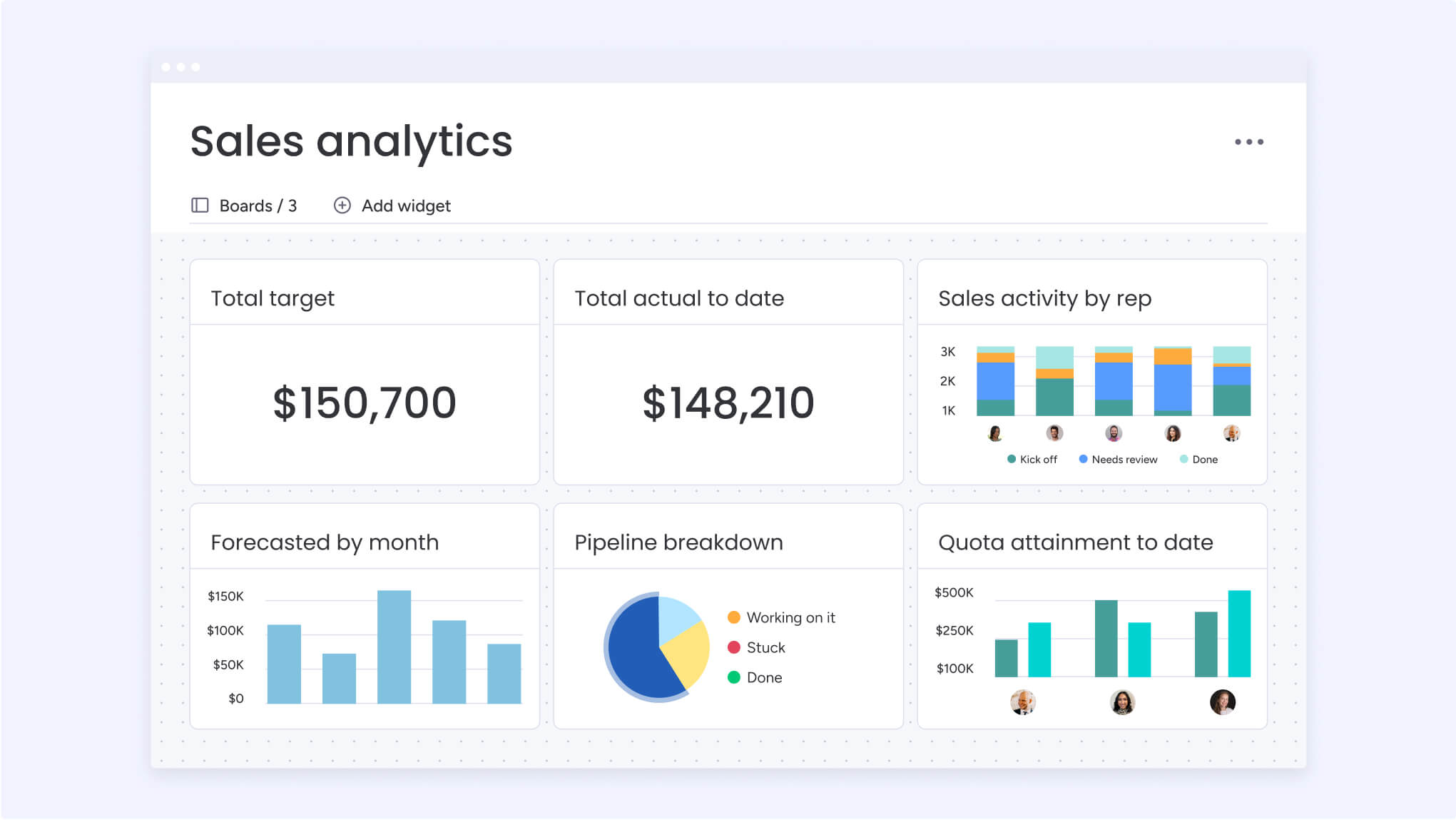
Aside from simplifying B2B sales processes and automating workflows, one of the main benefits of AI tools is their potential for actionable sales data. Many AI tools are packed with analytics that can provide valuable insights into every step of your sales funnel. AI platforms can analyze everything from customer sentiment in email exchanges to a lead’s likelihood to convert.
Predictive analytics in platforms like AI-driven CRMs can help sales teams identify at-risk deals and leverage sales forecasting models to get accurate revenue predictions for better strategic planning and resource allocation.
Keep humans in the loop at every stage
AI is powerful, but it’s not a replacement for your team’s judgment, creativity, or relationship-building skills. Always review AI-generated messages, double-check automation triggers, and keep your finger on the pulse of high-value deals.
Implement quality control alongside your AI adoption strategy and make sure to scale slowly to allow enough time for potential issues or roadblocks to get ironed out. Remember that AI excels at handling data-driven tasks and pattern recognition, but human judgment still remains crucial for building authentic relationships, navigating complex negotiations, and making strategic decisions.
Choose AI tools that integrate with your tech stack
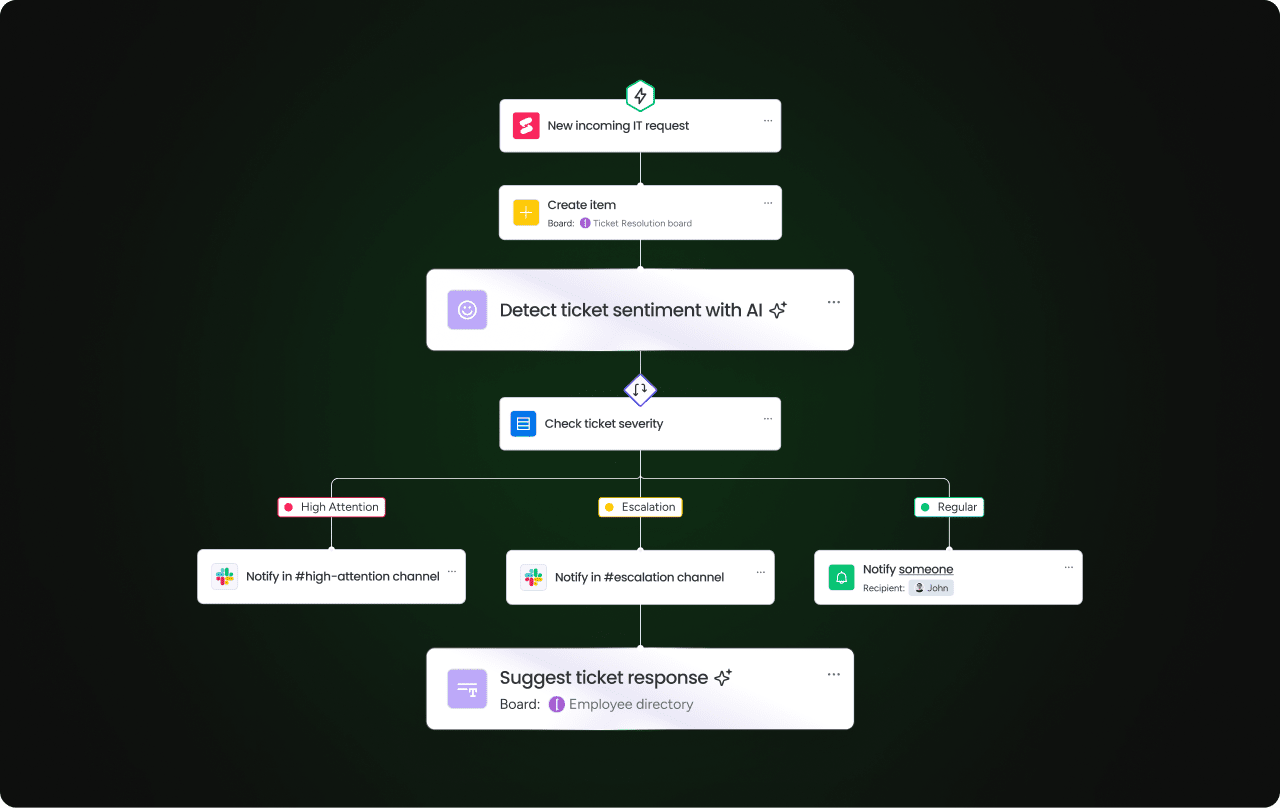
The goal of AI is to make your existing workflows easier, not to completely overhaul the processes you already have in place. It’s important to consider how an AI tool can sync and integrate with systems like B2B CRMs and ERPs.
That said, while you can choose individual AI B2B sales tools like conversation intelligence, sales engagement, or lead enrichment, you can also opt for a platform with built-in AI features, like an AI-powered CRM solution.
AI CRMs offer significant advantages over piecing together multiple standalone tools. With everything consolidated in one platform, such as monday CRM, your sales team benefits from a single source of truth where AI insights from lead scoring, pipeline forecasting, and customer interactions work together seamlessly, eliminating siloed data and workflow disruptions that often occur when implementing multiple tools.
Simplify sales automation with monday CRM’s B2B AI
A great option for an integrated B2B sales tool is an AI-powered CRM. With the right CRM, you’ll get access to a range of AI features that help move sales along and provide data-backed insights into progress. With a solution like monday CRM, your sales team can automate manual sales tasks like lead nurturing and task management while making the most of sales analytics that improve decision-making.
The AI features packed into monday CRM help teams work more productively without scaling the workforce or resources. One company, Oversight, was able to cut manual work by 50% thanks to the AI capabilities in monday CRM.
Here’s a closer look at some of the core AI features in monday CRM that make it ideal for B2B sales teams.
Smart AI sales automations
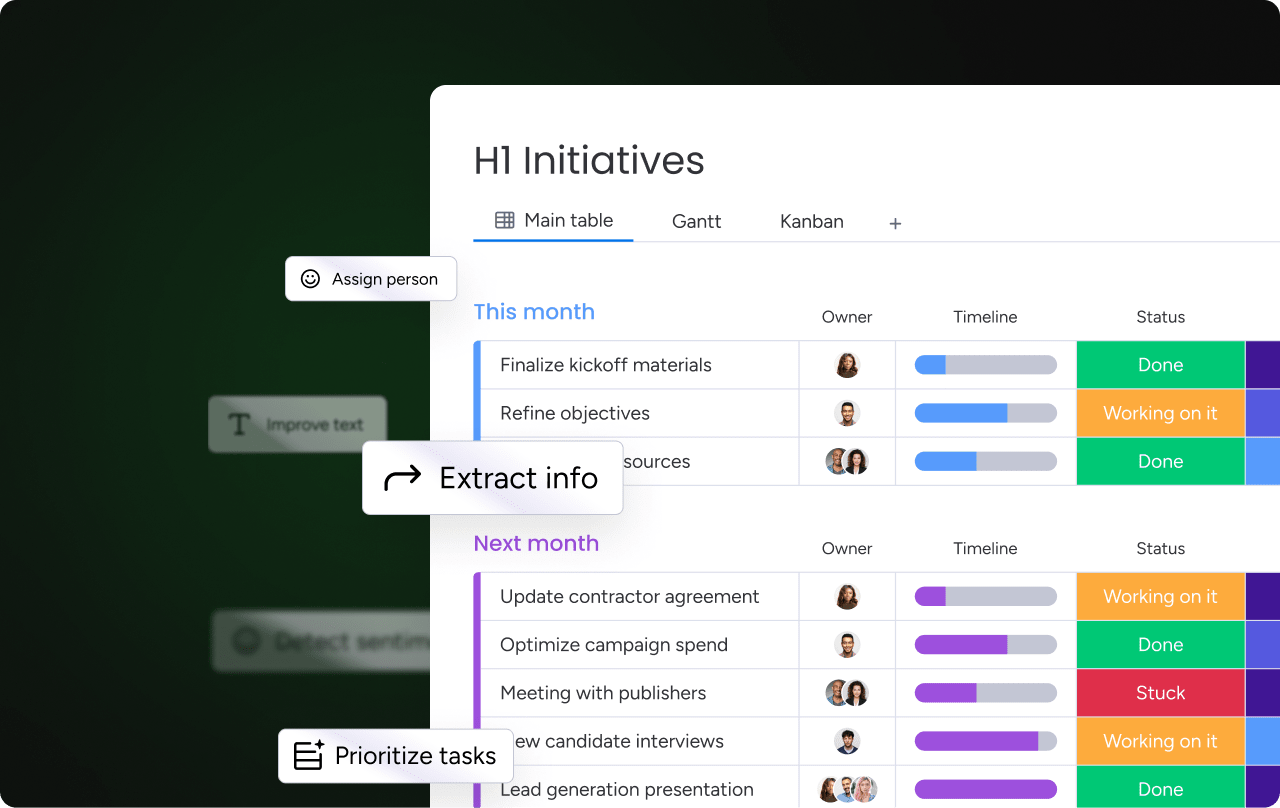
Automate manual tasks and repetitive workflows with monday CRM’s built-in AI automation features. With the built-in AI, you can instantly summarize email chains or meetings and turn the main ideas into actionable tasks. You can also automate pipeline management, such as approval processes, status updates, and following up with leads by using your words to create advanced AI automation formulas.
AI-powered lead management tools

Never let a lead slip away with monday CRM’s powerful lead management AI features. When a new prospect comes in, AI can work to qualify it based on custom parameters and then assign it a score. Next, AI can also route the lead to the right agent based on skills, territory, or workload availability so that every lead gets the attention it deserves.
Generative AI for sales personalization
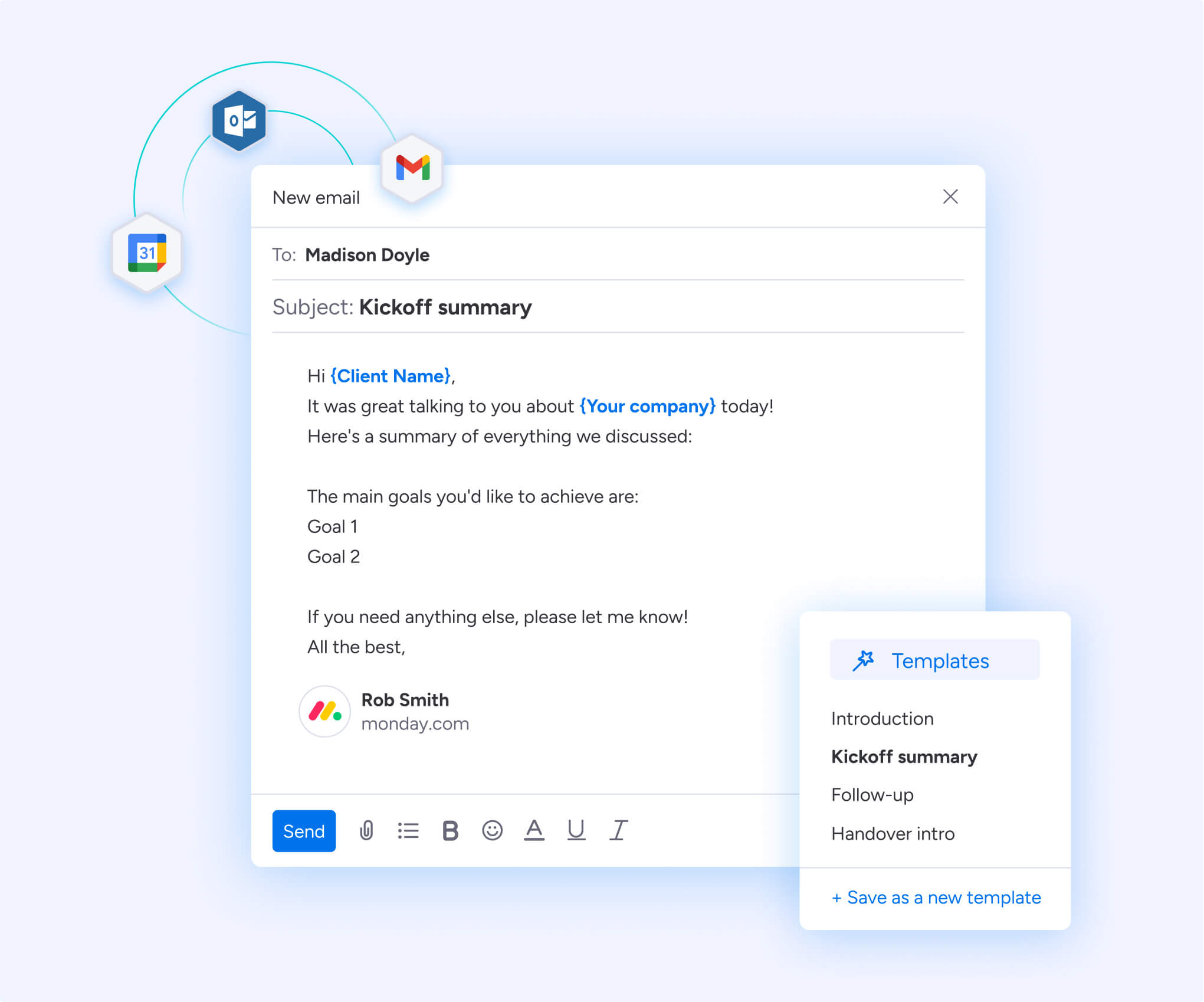
Instead of spending hours crafting unique B2B sales assets for each client, monday CRM’s AI can help you generate content for every step of the sales cycle. You can create scripts for sales calls or compose emails using smart template suggestions and using AI to strike the right tone based on client preferences and communication history.
Advanced AI data analytics
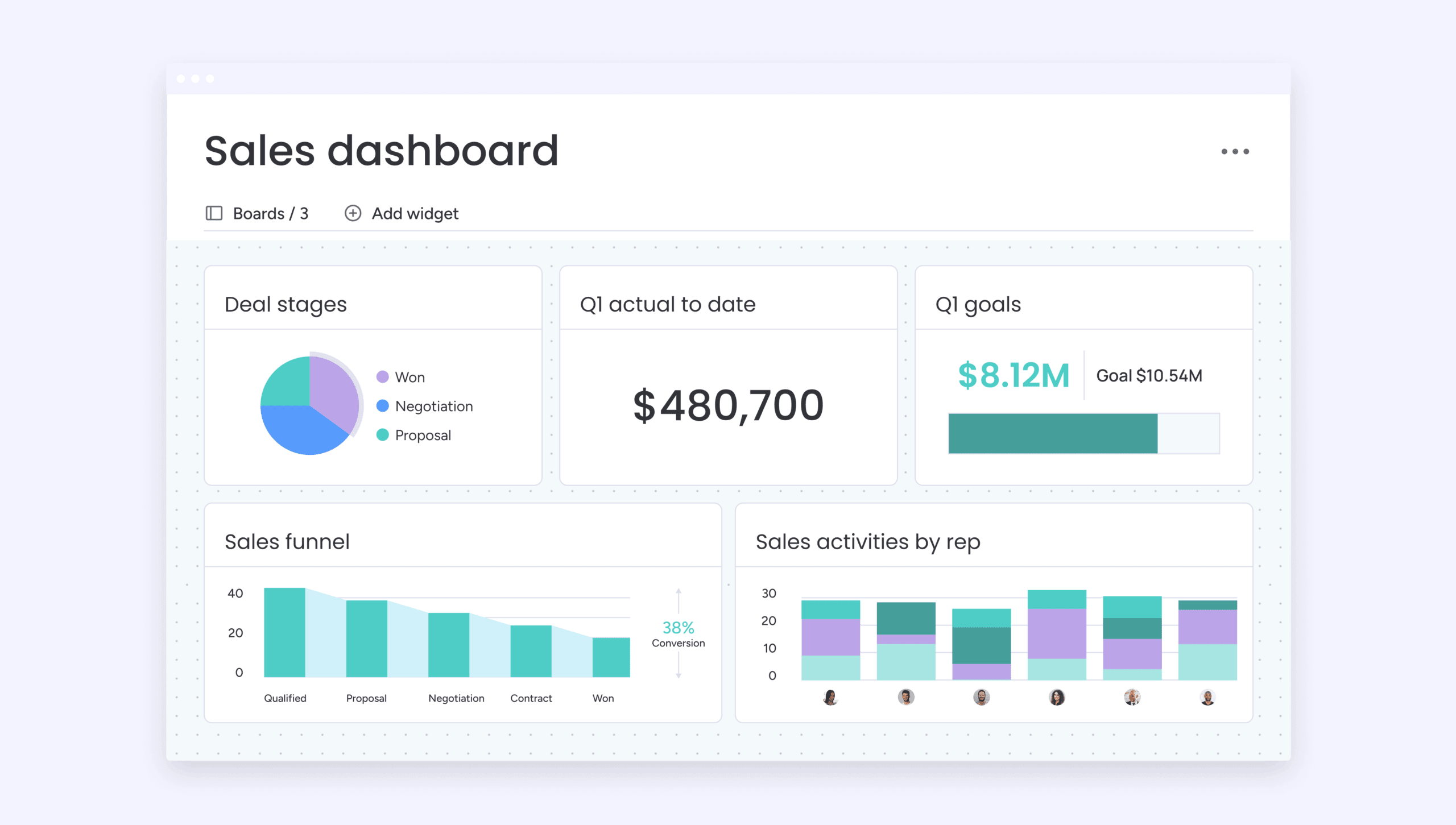
Keep a close eye on your sales team’s performance and deal progress with advanced analytics and built-in AI-driven dashboards. With monday CRM’s dashboard, track everything from lead engagement to post-sales management in one place, with AI on deck to pull tailored data and generate real-time reports that can offer actionable insights and suggestions to advanced stuck deals.
Try monday CRM3 trends in AI for B2B sales to keep an eye on
Sales teams have already had to adapt to advances in AI sales technology, but when we look ahead, it’s clear that there are more AI-enabled sales enhancements on the horizon. The B2B AI technologies we use today are likely to get smarter and more capable, opening the door to additional sales improvements.
Here’s a look at 3 major trends to expect in B2B sales AI tech:
1. AI agents will take center stage
AI agents are becoming a core part of sales operations and are helping teams increase sales and improve the customer experience. According to a report by Capgemini, AI agents are influencing how sales professionals operate across different sectors, and 82% of surveyed respondents plan to integrate them in the next few years.
AI sales agents are changing how B2B sales teams handle complex workflows while allowing human sellers to focus on high-value relationship building and strategic decision-making.
2. Generative AI will transform sales automation
A study by Gartner shows that by 2028, 60% of B2B seller work will be executed through conversational user interfaces via generative AI sales technologies, up from less than 5% in 2023.
This represents one of the most significant shifts in sales operations, as generative AI makes it easier for sales professionals to automate content creation and personalize outreach.
3. Smart pricing will impact deal conversions
AI will have a big impact on the future of pricing in B2B industries, as many businesses today rely on basic analytics to inform pricing strategies. According to research by McKinsey, AI-led price setting is going to have a significant effect on industries like energy distribution and shipping.
Generative AI can analyze public data and customer interactions to negotiate costs and automate price administration, making it easier for sales reps to understand pricing expectations before even speaking with a prospect.
The future of AI in B2B sales
AI has already transformed the way B2B sales teams work, and we’ve only scratched the surface of what’s possible. The next wave of innovation will reward companies that move early, experiment smartly, and choose tools built for their sales goals.
With an all-in-one platform like monday CRM, your team can achieve smarter lead targeting, faster deal cycles, and deeper customer insights all while keeping human connection at the heart of every interaction. Adopt the right AI at the right time, and you’ll be ready to turn today’s opportunities into tomorrow’s wins — no luck needed.
Try monday CRMFAQs
What is the best AI sales software for B2B?
The best AI sales software combines predictive analytics, automated workflows, and intelligent lead scoring in one platform. While Salesforce and HubSpot are well-known, monday CRM stands out for its built-in AI features — from summarizing meeting notes to scoring leads automatically — all in a single, intuitive workspace.
What are the top AI-powered B2B data enrichment platforms?
ZoomInfo, Clearbit, and Cognism lead the way in AI-based data enrichment, automatically filling in firmographic and technographic details for leads. monday CRM can integrate with these tools or use its own AI features to keep lead records fresh and complete, ensuring reps always have the full picture before reaching out.
Which AI sales software excels in B2B demand generation?
Top demand generation tools like Gong, Storylane, and Outreach excel at AI-powered lead nurturing and campaign automation. They offer lead scoring, behavioral triggers, and personalized content delivery. That said, all-in-one B2B solutions like monday CRM seamlessly integrate demand generation and sales execution in one platform.
How is AI changing B2B sales?
AI is transforming B2B sales by automating low-value tasks, improving forecast accuracy, and enabling hyper-personalized engagement. For example, a rep can walk into their day with a prioritized task list generated by AI, complete with context on each deal and suggested next steps, making it easier to focus on what moves the needle.
What is AI and big data for B2B sales?
AI and big data turn massive datasets — from CRM interactions to market trends — into actionable insights. This combination helps sales teams predict buying behavior, identify upsell opportunities, and target the right accounts at the right time. With monday CRM, AI and big data work hand-in-hand to deliver real-time insights directly in the tools your team uses every day.
What are the best AI sales enablement tools for B2B?
AI-powered sales enablement tools like Seismic, Highspot, and Showpad help teams deliver the right content at the right time in the sales cycle. These platforms use AI to recommend relevant case studies, product sheets, or demos based on deal stage and buyer persona. For an all-in-one approach, monday CRM integrates AI-driven content suggestions directly into your workflows, so sales reps have everything they need without switching tools.

